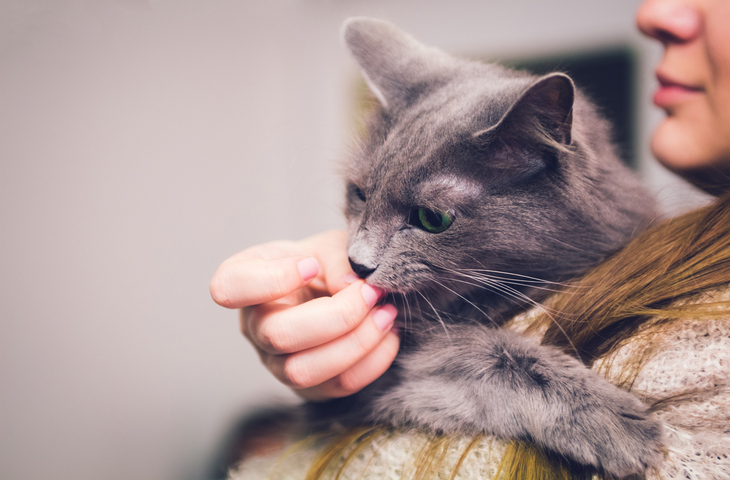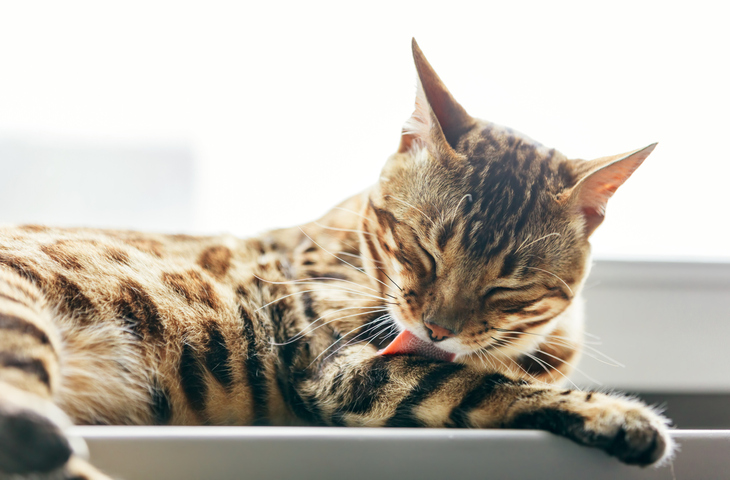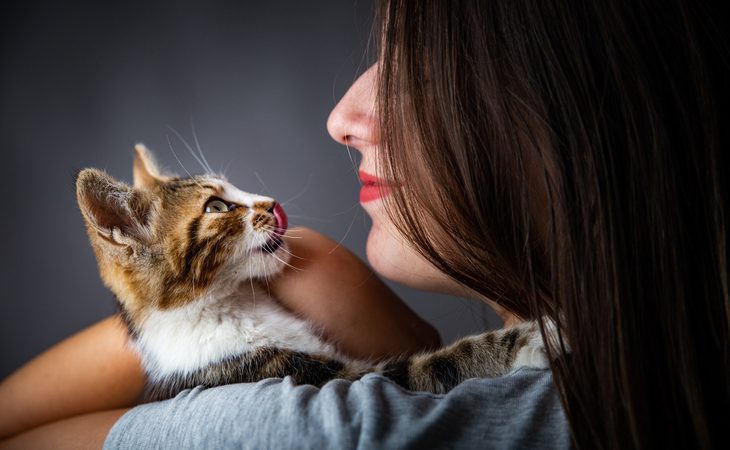Cats can lick you for many reasons. It can be a sign of affection, to better decipher smells, or even a way to calm their anxiety. In this article, we will go into detail about why cats lick their owners.
Where does this behavior come from?
Cats lick themselves to groom themselves. It is an essential part of who they are. When kittens are young, they are groomed by their mother. This is where they acquire this habit.
Your cat licks you to strengthen your bond
To begin with, when cats lick their owners, it could be to form of a social bond.
A sign of affection
When a cat licks you, it may be a sign of affection, of trust or to show you that you belong to its social group or family. When kittens are small, their mother uses licks them to praise good behavior or as a sign of integration into a social group. To see if this is a positive sign, look at other elements of the cat’s body language as it licks you. For example, is your cat sleeping close to you? Is your cat rubbing his head against yours? Is he or she purring? All of these are positive signs of trust. Your pet is relaxed.
Your cat licks you because of the smell
Marking their territory
If you have been in contact with other cats, you have odors on you that might be unknown to your cat. By licking you, your cat is trying to cover the existing odors and replace it by his or her own. When cats lick you, they are essentially leaving their scent on your skin. It is a signal to other animals that you “belong” to them. This is a way for cats to claim their territory. This is also what happens when cats rub themselves against your legs.
An attractive scent
Cats may lick you because you have a scent on your skin that attracts them and they want to taste it. Licking allows them to better perceive odors. It may be the smell of your sweat that attracts your cat with its slightly salty aroma. If your cat licks your fingers after you’ve recently eaten food, he or she is looking for the taste of what you ate. Is your cat licking your hair? That may be because it is filled with odors that your cat is trying to identify.

Licking and biting: a sign of aggressiveness?
Sometimes your pet may lick you affectionately, then suddenly bite you. Why do they do this?
Nibbling, not to be confused with a bite
It is important to understand the difference between nibbling and biting. It all depends on the intensity of the bite. Cats nibble on a daily basis to groom themselves. They chews their hair to remove dirt and clean themselves better. In these circumstances, small nibbles can also be a sign of a willingness to groom you or a sign of affection towards you.
A strong bite
If your cat licks you and then bites you suddenly and brutally, this is a sign of aggression. These bites can be painful.
Some cats come and sit on your lap or near you, but do not necessarily want to be touched. When you pet them, they may lick your hand to ask you to stop, then bite you when they have had enough.
Generally, you can observe other aspects of their body language to determine whether or not cats want to be touched or not. If their ears are flattened back or they have rigid, contracted body with their hair standing up and their tail flicking back and forth, it means that they are annoyed. If your cat behaves in this manner, it is best to leave him or her alone.
Punishment is unnecessary
There is no point in punishing cats when they lick you and then bite you. It’s completely counterproductive. Cats do not understand the concept of punishment. In fact, it will only teach your cat to fear you. This can damage your relationship.
If your cat bites you, simply stop your interaction with your cat.
When should you consult a veterinarian?
In general, cat owners like to be licked by their cats. They find it very cute. However, in some cases, cats that lick may require a trip to the vet.
Warning signs
In general, it is best to consult your veterinarian when your cat exhibits unusual behaviors that recur. If your cat is licking itself or you compulsively and repeatedly, it’s best to have your cat checked for their health as a precaution, even if there are no other warning signs.
In addition, if repeated licking leads to self-injury, talk to your veterinarian to identify the cause. If your cat has become aggressive with you (licking and biting on a regular basis), consult your veterinarian to make sure there isn’t a physiological problem.
Licking: a way for the cat to calm its anxiety
Do you feel like your cat is licking you or licking itself all the time? This may be a sign of discomfort. Ask your veterinarian for advice. If he or she rules out any medical causes, it could mean that your cat is suffering from an anxiety or stress.
Cats are creatures of habit. They like routines and they have their habits. Any disturbance in their rhythm of life is a factor of anxiety for your cat and can cause behavioral problems. A few things that can cause your cat to be anxious is a move, the arrival of a baby in the family, or the adoption of a fellow cat or another animal.
A feline behavior professional can help you solve the problem. You can also ask your veterinarian to treat your cat with medication.

Pathological licking
Does your cat spend hours licking itself or you insistently? This may be a sign of feline hyperesthesia syndrome. While the causes of this disease are not clear, it is often found in cats that have been poisoned, exposed to toxic fumes, are deficient in food, or have thyroid dysfunction. These causes are not exhaustive. For example, the source can be neurological, dermatological, or even behavioral.
These pets have heightened sensitivity. They alternate between resting states, during which the cat is in a normal state, and seizure states, characterized by a number of unusual behaviors. Excessive licking is one such behavior, as is tail-biting and self-mutilation. Consult your veterinarian for more information.
Can licking transmit diseases?
Some owners prefer not to have their cat lick them because they are afraid that their cat’s saliva will transmit germs and diseases. However, is this a real risk?
Prevention
When you pet your cat or have your cat lick you, wash your hands with soap afterwards. Licking a wound or sore is not recommended, nor is licking on the face, as a cat’s tongue is covered with germs. Most of the time, respecting these basic hygiene rules is sufficient for prevention. In addition, remember to deworm your cat regularly.
Diseases
Overall, the risk of disease transmission through licking is very low. However, cat-scratch disease is sometimes mentioned. It is caused by a bacterium. While this disease is most commonly transmitted by cat scratches, it can also be transmitted by licking a skin wound.
Another disease is toxoplasmosis, which is not transmitted by licking. It is a parasitic infection that is spread through cat feces. Be sure to wash your hands or wear gloves every time you clean your cat’s litter box.

